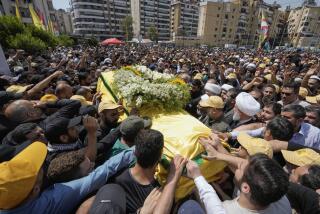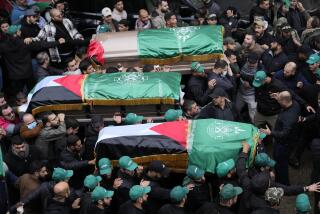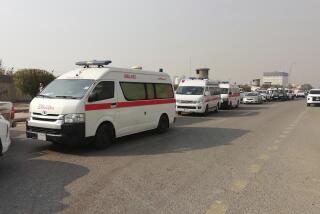Bombing kills popular Iraqi police chief
- Share via
BAGHDAD — About the same time that he was being praised by U.S. commanders for his role in improving security in Babil province, south of Baghdad, a popular police chief was killed Sunday by a roadside bomb that struck his convoy.
Maj. Gen. Qais Hamza Mamouri died along with two bodyguards in Hillah, capital of the predominantly Shiite Muslim province, about 60 miles south of Baghdad, Iraqi law enforcement officials said.
It was the latest in a series of assassinations of high-ranking officials in the country’s oil-rich south, where militias and tribal factions are engaged in a violent power struggle.
Also Sunday, gunmen in Samarra fatally shot Brig. Gen. Amjad Muleesi, a former military court judge for the Republican Guard under former President Saddam Hussein, police said.
Babil is expected to be transferred soon to the control of Iraqi forces, as the U.S. military seeks to take more of a support role in enforcing the country’s security.
At a lunchtime media briefing in Baghdad, U.S. military officials had praised Mamouri for helping make the region more secure.
“We’re very lucky in Babil province to have Maj. Gen. Qais, who is a very good Iraqi police chief for that province,” U.S. Army Col. Tom James, commander of the 4th Brigade Combat Team, 3rd Infantry Division, in north Babil, told reporters. “He is committed to securing Iraq for the people, the population. He does not see anything through a sectarian lens, it’s all about Iraqi law, and the people see that.”
Law enforcement officials in Hillah said Mamouri’s motorcade was hit at the city’s north entrance as he was on his way to inspect a local police station. The attack reportedly occurred at lunchtime.
There were no immediate claims of responsibility, but local police sources blamed militants aligned with the insurgent group Al Qaeda in Iraq.
Last week, a group called Islamic State of Iraq posted an audiotape on a militant website announcing a new bombing campaign against U.S. forces and the “traitors” who fight with them.
Two southern provincial governors were killed during the summer, and Mamouri reportedly had been the target of six previous assassination attempts.
“Iraq today lost a faithful son and courageous military leader, a citizen who pledged his allegiance to the constitution and the values of righteousness and justice,” Iraqi President Jalal Talabani said. “The hands of treachery and crime have reached . . . a man known for his straightness and devotion to his duty.”
Talabani denounced the assault as a “cowardly act” and vowed to pursue the attackers and bring them to justice.
Capt. Muthanna Ahmed Abul Harith, a spokesman for the Hillah police, said officers there felt “very sad about their commander’s death,” and “the resentment is clear among the policemen.”
Harith said a curfew had been imposed in Hillah, and security forces had been deployed in the city. The governor of Babil announced three days of public mourning, starting today.
Mamouri assumed his position shortly after the 2003 U.S.-led invasion of Iraq. Since then, Harith said, Mamouri had worked to bolster and improve the police force in Hillah.
“He made strong foundations for the Iraqi police in this city,” Harith said. “That is why it is considered as one of the quietest provinces in the south of Iraq.”
Mamouri’s charisma, objectivity and refusal to politicize law enforcement also won him major marks from Iraqi and U.S. military officials.
“He happens to be [Shiite], but he’s Iraqi,” said Maj. Gen. Rick Lynch, commander of the 3rd Infantry Division. “And if you’re anti-Iraqi, he’s anti-you; and he’s taken action against the anti-Iraqi forces across Babil province.”
Lynch, who spoke at the lunchtime news briefing, added that Mamouri had been able to “relate to the provincial governor and the national government,” and that was critical since “they have to work together to meet the security needs of the people.”
Harith, the police captain, said Mamouri had recently received an order to transfer from Hillah to the Interior Ministry in Baghdad.
“He was not objecting to that at all, but the people did,” Harith said. Two days ago, Harith said, Mamouri told him, “As we wear this uniform, we have to be ready to serve in any place in Iraq we are ordered to go.”
Reports of Mamouri’s transfer order could not be independently verified.
--
Times staff writers Alexandra Zavis, Saif Hameed and Raheem Salman in Baghdad and a special correspondent in Hillah contributed to this report.
More to Read
Sign up for Essential California
The most important California stories and recommendations in your inbox every morning.
You may occasionally receive promotional content from the Los Angeles Times.











